The Daily Beast
by Will Cathcart
September 8, 2009
…
Sanford has been a loner his entire political life; it was not at all out of character when he sought to turn back the Obama administration’s offer of federal stimulus money for his state—a fight he lost with the state General Assembly. Saving his scalp—with the legislature as well as the rank-and-file voters—will require him to do something he’s never been comfortable doing: slap backs, trade stories, and get on with the good ole boys.
It won’t be easy. He knows his brand of extreme fiscal conservatism is suddenly very much in fashion, as the Obama administration runs up the deficit. And he knows he’s shot himself in the foot, big time. “I’m a wounded soldier; I took myself off the battlefield,” he says. “It’s not until you lose something in life that you appreciate some of your blessings. If I ever had the chance to get back on the playing field, it would be a great honor and a privilege and a blessing.”
“You know,” the South Carolina governor continues, “everybody is assigned their own secret-agent mission in life. And at times the tricky part, the hard part, is finding out what that secret-agent mission is. Some of us do it early, some of us do it later in life.” Simply put, nobody else in the Palmetto State’s political class talks like that.
It’s tempting, Sanford admits, to go “hide under a rock, go down to the farm and never see another television camera again.” That temptation must have only grown last week, when Lieutenant Governor Andre Bauer wrote a letter calling for Sanford’s resignation and offered to take over the job. But, as Sanford puts it, “you gotta stay around for the second half of the show”…
As he enters what may well be the home stretch of his political career, Sanford sounds weary, but determined to push on through.
“I’m going to keep doing the business that the people of South Carolina really care about,” Sanford says. “I can’t tell you how many people come up to me and say ‘this has got to be a three-ring circus; this has got to be a witch hunt. This is about David Thomas trying to run for Congress, and thinking he can build his name by having these ‘investigations’ that are little about investigation and a whole lot about making papers … What we are going to continue to try to do is, one, get back to business. At the end of the day, the subtleties of my relationship with Jenny are not going to impact one way or another somebody who lives in Sumter who is struggling to make it.”
People can’t stop interviewing Governor Sanford. Governor Sanford can’t stop giving interviews [and I can’t stop reading them]. He does the usual politician stuff – reframes the motives of the critics as selfish, "This is about David Thomas trying to run for Congress, and thinking he can build his name by having these ‘investigations’ that are little about investigation and a whole lot about making papers" or "A lot of [South Carolina politicians] are saying, ‘Hey, it’s payback time, we got you now." So he divorces himself from their criticisms by questioning their motives. Elsewhere, he implies that his critics are angry at him for his integrity vis-a-vis his Conservative principles. And he minimizes his own mis-steps, "At the end of the day, the subtleties of my relationship with Jenny are not going to impact one way or another somebody who lives in Sumter who is struggling to make it."
But the thing that makes his interviews of interest is the quasi-supernatural stuff – his destiny to rule. He says it in one way or another every time he talks, "everybody is assigned their own secret-agent mission in life. And at times the tricky part, the hard part, is finding out what that secret-agent mission is. Some of us do it early, some of us do it later in life." I’ve been trying to think of other people that evoke destiny or being chosen as a reason for staying in office. He’s said it so often, it must be something he believes – a strong "C Street" line of thinking. Putting aside the arrogance of such a position is hard. He both believes he is destined [chosen] to lead [pretty special], and he seems to think that this belief he holds should bind others to let him [real special].
But laying that on the sidelines and back to, "
everybody is assigned their own secret-agent mission in life. And at times the tricky part, the hard part, is finding out what that secret-agent mission is. Some of us do it early, some of us do it later in life." Assuming he really believes that [and I think he really does], how was this
assignment revealed to him? How did he find out this
tricky part – that being Governor of South Carolina is his
secret-agent mission? Is he just a self-preoccupied narcissist, or is this line of thinking something he was taught? If you read
The Family by
Jeff Sharlet, what he’s saying sounds very much like the sermons and discussion topics from
C Street and
Ivanwald, as did his earlier reference to
David and Bathsheba:
I have been doing a lot of soul searching on that front. What I find interesting is the story of David, and the way in which he fell mightily, he fell in very very significant ways. But then picked up the pieces and built from there.
That he says it at all is remarkable. That he says it in interviews as if someone might hear it and accept it as reasonable is the most remarkable thing of all. I think my fascination with Mark Sanford goes beyond his sense of entitlement. There’s something about his "quirkiness" that earns him the title that Sarah Palin embraced – Maverick [in her case, it was hard to know what she was talking about since "maverick" and "goofy" aren’t exactly synonyms]. But Mark Sanford actually seems to fit:
mav⋅er⋅ick [mav-er-ik mav-rik]
–noun
-
Southwestern U.S. – an unbranded calf, cow, or steer, esp. an unbranded calf that is separated from its mother.
-
a lone dissenter, as an intellectual, an artist, or a politician, who takes an independent stand apart from his or her associates.
Origin: 1865–70, Americanism; after Samuel A. Maverick [1803–70], Texas pioneer who left his calves unbranded
Synonyms: nonconformist, independent, loner.
I recalled an article I had run across earlier, written during the Presidential Campaign:
I won’t be voting for Barack Obama for president. There are too many vital issues — from taxes and spending, to immigration and national security, to traditional values — on which we have fundamentally different points of view about the right direction for our country. However, as the presidential campaign trail now makes its turn toward this state, and as South Carolinians make their final decisions on whom to vote for, it’s worth pausing to take notice of something important that the Obama candidacy means for our corner of America.
South Carolinians are rightly proud of our state’s rich heritage and history, dating from the earliest Colonial times and our ancestors’ heroic efforts in the Revolutionary War right up to the present day. I say this because we’re a state that loves history, and one of the nicest parts of my job lies in constantly being exposed to the extraordinary achievements of South Carolinians past and present. In the Obama candidacy, there is a potentially history-making quality that we should reflect on. It is one that is especially relevant on the sensitive topic of race — because South Carolina and the South as a whole bear a heavier historical burden than the rest of our country on that front.
As governor, I try to keep that historical burden in mind, because being sensitive to race has both policy and symbolic implications. I strongly believe that policies such as school choice and reforms to allow Medicaid recipients additional health care options will have a disproportionately positive impact on African-Americans in our state. Others disagree, favoring a larger role for government than the private sector, and those legitimate policy disagreements will always be with us in the political arena.
On the symbolic front: Having a more diversified Cabinet, issuing the first formal apology for the Orangeburg Massacre and traveling across the state line to Georgia to address the South Carolina NAACP convention have all represented small steps aimed at building bridges across waters that have divided us for too long as South Carolinians. In short, just like hundreds before me and scores of others trying in their own ways, I try to build bridges where I can — but I write because it all pales in comparison to the change that may be before us.
Sen. Obama is not running for president on the basis of his race, and no one should cast their ballot for or against him on that basis. Nonetheless, what is happening in the initial success of his candidacy should not escape us. Within many of our own lifetimes, a man who looked like Barack Obama had a difficult time even using the public restrooms in our state. What is happening may well say a lot about America, and I do think as an early primary state we should earnestly shoulder our responsibility in determining how this part of history is ultimately written.
One could read this as an attempt to disavow racism as a factor in his personal vote. We’re used to hearing that kind of thing. But as I reread it, I felt like it had the characteristic stamp of Mark Sanford’s specific quirkiness – massive unresolved ambivalence. Mark Sanford’s modus operandi is invariant. When he feels two opposite things that can’t be resolved, rather than reaching a conclusion [compromise], he tries to keep both things alive, and does something he calls "soul searching," as if the fact that he’s struggling with the dilemma in enough. If you’re an "an unbranded calf," you never have to resolve anything. He tells us that he has a wonderful, loyal, wife and that he has found a soul-mate in Argentina, thinking that it will be okay because he has struggled with the problem. He tells his wife that he wants to work things out and that he wants to visit his true love. He tells us that we should disavow South Carolina’s racist past and not vote for Obama for raciast reasons. He votes for impeaching Clinton for philandering and avers that his own philandering has no impact on his job. That Mark Sanford can’t resolve his ambivalence is telling, but even more telling is his expectation that we will forgive it because he’s struggling. That second part is the real quirk.
I propose that the reason Mark Sanford expects us to "understand" is because his unresolved ambivalence is not a ruse. It’s a curse. There is a gulf between his thoughts and his emotions that rules his life. He acts on his feelings, but genuinely doesn’t know it. Likewise, I expect that he actually doesn’t know what he feels most of the time and relies on formulae – like "conservative principles" or "Christian principles" or the last crazy sermon he heard at C Street.
Likewise, though he speaks in vague, abstract terms, his ability to think abstractly is impaired. In this op-ed, he uses the term "symbolism," but all he can see in Obama is a black American. He sees Obama’s policies [Medicaid, School Choice] as "black." You don’t "build bridges" if things aren’t separated. I interpret his comment, "everybody is assigned their own secret-agent mission in life. And at times the tricky part, the hard part, is finding out what that secret-agent mission is" as being about his own relationship with his internal experience – it’s a secret. What’s tricky for Mark Sanford is knowing what he feels [if it’s not overwhelming].
In the case of being South Carolina’s Governor, he says:
And he knows he’s shot himself in the foot, big time. “I’m a wounded soldier; I took myself off the battlefield,” he says. “It’s not until you lose something in life that you appreciate some of your blessings. If I ever had the chance to get back on the playing field, it would be a great honor and a privilege and a blessing.”
While he says that like it’s a startling new understanding, a great insight, it’s something any fool already knows. And, having been caught in the act by his wife and surrounded by friends and therapists trying to point out to him what he was doing, he snuck off to Argentina to see Maria and tried to sneak back – coming clean only when he was met by a reporter from The State [In some ways, I wish the reporter had snapped her picture from afar, outside of his line of sight – it would’ve been telling to see if he would have "come clean" if he thought he could bring off the Appalachian Trail story]. There were a legion of allies trying to teach him this lesson before he went. His recurrent new lesson is a sham – it’s as old as history. Yet for him, the feeling that he wants to be Governor is like some new revelation.
Don’t it always seem to go that you don’t know what you’ve got ’til it’s gone…
Joni Mitchell
Mark Sanford is not a bad man, he’s a sick man, an impaired man. And the reason he ought to be impeached is that he’s not capable of making rational decisions for his State. How he came to be a person who has his self-destructive quirks is for he and his therapists to work out, not the people of South Carolina. His diagnosis? None of my business…
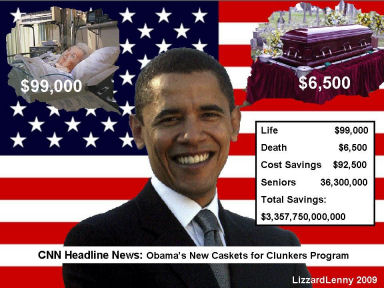






 I first met Shirley Franklin in a Virginia-Highland backyard at a party. She’s a snaggle-toothed black lady with short blond hair and a gravelly voice. She’s got a "spring in her step" even when she’s not walking. I knew I’d vote for her before I even knew who else was running. In Atlanta, we’d had a number of black Mayors – pretty classy people – but they’d ignored the nitty-gritty, the sewers and roads. It fell to Shirley to make up for their inattentiveness. She was personally on the street shoveling asphalt into pot holes in her first few months. She fought with everyone who needed fighting with and pissed off somebody from every angle of Atlanta’s varied pantheon. And she got the job done.
I first met Shirley Franklin in a Virginia-Highland backyard at a party. She’s a snaggle-toothed black lady with short blond hair and a gravelly voice. She’s got a "spring in her step" even when she’s not walking. I knew I’d vote for her before I even knew who else was running. In Atlanta, we’d had a number of black Mayors – pretty classy people – but they’d ignored the nitty-gritty, the sewers and roads. It fell to Shirley to make up for their inattentiveness. She was personally on the street shoveling asphalt into pot holes in her first few months. She fought with everyone who needed fighting with and pissed off somebody from every angle of Atlanta’s varied pantheon. And she got the job done.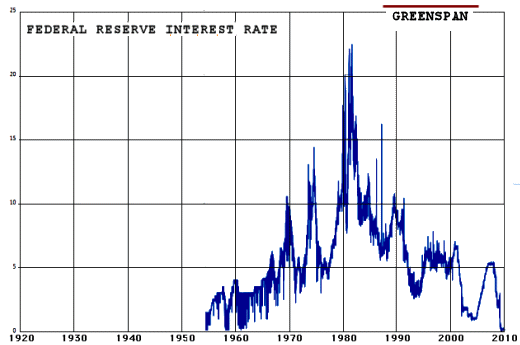

 After the early 1980’s, that was no longer true. What happened in the early 1980’s? Reagan [omics]; Deficit Spending; Tax Cuts; Deregulation; Greenspan. It’s pretty striking that the graph looks like a Christmas Tree. So, either Reaganomics changed the playing field OR Greenspan kept Interest Rates too low to have the tool available for the next downturn. I wonder if he thought he was doing something good – keeping the credit flowing as part of the Reaganite/Republican easy-money meme that almost buried us. Whatever he thought he was doing, he was wrong as rain…
After the early 1980’s, that was no longer true. What happened in the early 1980’s? Reagan [omics]; Deficit Spending; Tax Cuts; Deregulation; Greenspan. It’s pretty striking that the graph looks like a Christmas Tree. So, either Reaganomics changed the playing field OR Greenspan kept Interest Rates too low to have the tool available for the next downturn. I wonder if he thought he was doing something good – keeping the credit flowing as part of the Reaganite/Republican easy-money meme that almost buried us. Whatever he thought he was doing, he was wrong as rain…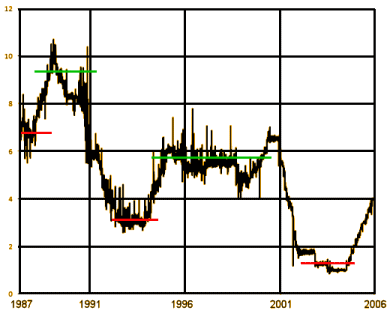
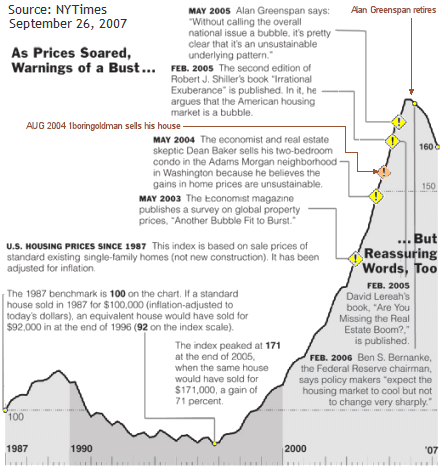


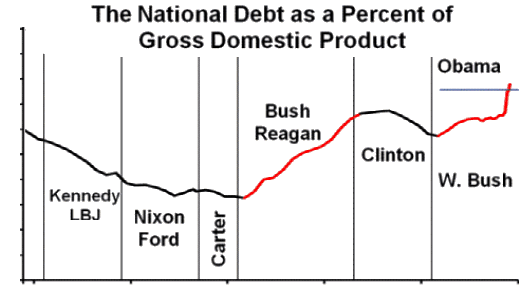

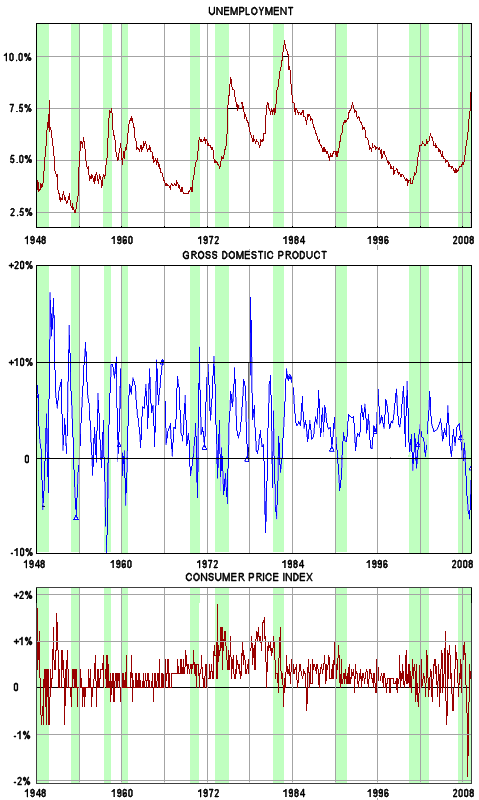
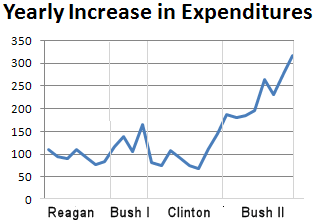
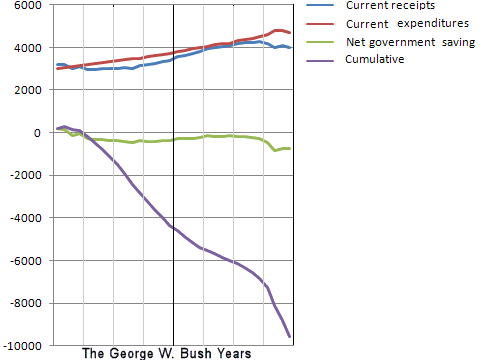
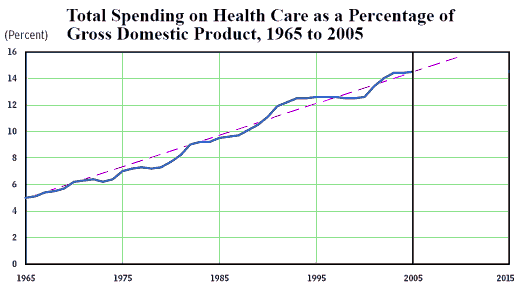
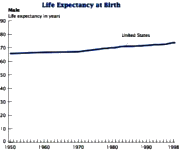 The extrapolation in red is my own as their data stopped at 2005 [I believe we are actually at 17%]. Health care costs are rising much faster than inflation, tripling in the last 45 years, even when corrected for inflation. That can’t keep happening, thus the push to regulate health care costs and to make health care available to all people. This isn’t an optional task, it’s an essential task. Discussions of why these costs have soared are interesting but irrelevant. No argument about the wonderful new technology and advanced drugs in medicine matters if it’s only available for the few. I think of it as the medical bubble, hiding behind science. We’re living longer by tiny increments, not by anything that would explain the inflation of costs.
The extrapolation in red is my own as their data stopped at 2005 [I believe we are actually at 17%]. Health care costs are rising much faster than inflation, tripling in the last 45 years, even when corrected for inflation. That can’t keep happening, thus the push to regulate health care costs and to make health care available to all people. This isn’t an optional task, it’s an essential task. Discussions of why these costs have soared are interesting but irrelevant. No argument about the wonderful new technology and advanced drugs in medicine matters if it’s only available for the few. I think of it as the medical bubble, hiding behind science. We’re living longer by tiny increments, not by anything that would explain the inflation of costs.